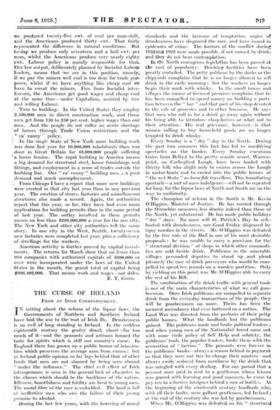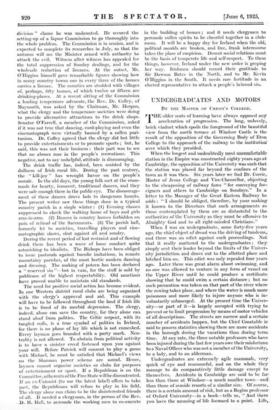THE CURSE OF IRELAND
FROM AN IRISH CORRESPONDENT.
' setting about the reform of the liquor laws, the •• GoVeniments of- Northern and Southern Ireland have laid the axe to the root •of Irish ills. Drunkenness • is an evil of long standing in Ireland. In the reckless eighteenth century the gentry drank claret—far too much of it—and the peasants and artisans formed the taste for spirits which is still our country's curse. In England there has grown up a public horror of intoxica- • tion which preserves the average man from excess ; but in Ireland public opinion so far lags behind that of other lands that men are not shamed by being seen abroad " under the influence." The chief evil effect • of Irish • intemperance is seen -in the general lack of character in the classes which -should be the -backbone of the nation. Idleness,•boastfulness and-futility are -bred' in ybung men. The moral .fibre'of the race is enfeebled. The land-is full of ineffective men Who owe the• failure of their young promise to alcohol. - -• - • - During the last few years, with the lowering of moral standards and the increase of temptation, orgies of drunkenness have disgraced the race, and have issued in epidemics of crime. The horrors of the conflict during 1922 and 1923 were made possible, if not caused, by drink, and they do not bear contemplation.
In the North courageous legislation has been passed at the cost of popularity. Drinking facilities have been greatly curtailed. The petty publican by the docks or the shipyards complains that lie is no longer allowed to sell drink in the early morning ; but the workers no longer begin their work with whisky. In the small towns and villages the owner of licensed premises complains that he has been compelled to spend money on building a parti- tion between the " bar " and that part of his shop devoted to the sale of groceries and to other business. He says that men who call in for a drink go away again without his being able to introduce clasp-knives or what not to their attention. His real grievance, however, is that women calling to buy household goods are no longer tempted to drink whisky.
Every Sunday is a " dry " day in the North. During the past two summers this fact has led to unedifying spectacles on the border. Every Sunday excursion trains• from Belfast to the pretty seaside resort, Warren- point, on Carlingford Lough, have been loaded with thirsty folk who alight only to swarm across the Lough in motor-boats and to crowd into the public houses of " the wet State " as bona fide travellers. This humiliating spectacle—a sort of mass indulgence—will not be repeated for long, for the liquor laws 'of North and South are on the way to uniformity.
The champion of reform in the South is Mr. Kevin O'Higgins, Minister of Justice. He has carried through the Oireachtas measures, less drastic indeed than those of the North, yet substantial. He has made public holidays " dry " days. No more will St. Patrick's Day be cele- brated with drunkenness, nor Good Friday disgraced by tipsy rowdies in the streets. Mr. O'Higgins was defeated by the free- vote of the Dail in one of his most desirable proposals : he was unable to carry a provision for the " structural division " of shops in which other commodi- ties are sold beside drink. Publicans in the miserable villages persuaded deputies to stand up and plead piteously the case of drink purveyors who would be com- pelled to spend ten pounds on a wooden partition. Only by yielding on this point was Mr. O'Higgins able to carry the rest of his Bill.
The combination of the drink traffic with general trade is one of the main characteristics of what we call goat- beenism. Once Irish publicans are compelled to separate drink from the everyday transactions of the people, they will be goinbeeninen no more. Theirs has been the Meanest ascendancy that ever battened on a nation. The Land War was directed from the parlours of their petty public houses. What the landlords lost the publicans gained. • The publicans made and broke political leaders ; and when young men of the Nationalist breed came out with some virile policy of Self Help and sobriety, the publicans' tools, the popular leaders, broke them with the accusation of " faction." The peasants were forever in the publicans' books—always a season behind in payment so that they were not free to change their masters—and always easily seduced from manliness by the drink that was mingled with every dealing. For one pound that a peasant once paid in rent to a gentleman whose leisure was graced with learning and good manners, he came to pay teri to a furtive intriguer behind a row of bottles. At the beginning of the nineteenth century landlords who, with all their faults, were gallant gentlemen, led Ireland ; at the end-of the 'century she was led by gombeenmen.
When Mr. O'Higgins was defeated on his " structural division " clause he was undaunted. He secured the setting-up of a liquor Commission to go thoroughly into the whole problem. The Commission is in session, and is expected to complete its researches in July, so that the autumn will see the Minister armed with authority to attack the evil. Witness after witness has appealed for the total suppression of Sunday dealings, and for the wholesale reduction of licences. At the outset, Mr. O'Higgins himself gave remarkable figures showing how in many country towns one in every three of the hoUses carries a licence. The counties are studded with villages of, perhaps, fifty houses, of which twelve or fifteen are drinking-places. At a recent sitting of the Commission a leading temperance advocate, the Rev. Dr. Coffey, of Maynooth, was asked by the Chairman, Mr. Horgan, what the clergy and the temperance societies were doing to provide alternative attractions to the drink shops. Senator O'Farrell, a member of the Commission, asked if it was not true that dancing, card-playing and even the cinematograph were virtually banned by a sullen puri- tanism. Dr. Coffey agreed that the clergy did but little to provide entertainments or to promote sports ; but, he said, this was not their business : their part was to see that no abuses rose in the people's recreations. This negative, not to say unhelpful, attitude is discouraging.
The drink traffic has, indeed, been assisted by the dullness of Irish rural life. During the past century, the " kill-joy " has wrought havoc on the people's morale. In the old days, the young folk met at the cross- roads for hearty, innocent, traditional dances, and they were safe enough there in the public eye. The discourage- ment of these dances drove lads to dangerous haunts. The present writer saw these things done in a typical country parish in a single winter : (1) Evening classes suppressed to check the walking home of boys and girls arm-in-arm. (2) Dances in country houses forbidden on pain of refusal of the Sacraments. (3) The parish hall, formerly let to societies, travelling players and cine- matographic shows, shut against all and sundry.
During the recent period of lost restraint and of flowing drink there has been a wave of loose conduct quite astonishing to idealists. The Bishops have been obliged to issue pastorals against bucolic imitations, in remote mountainy parishes, of the most hectic modern dancing and dressing. The making of poteen has been declared a " reserved sin "—but in vain, for the stuff is sold by publicans of the highest respectability. Old sanctions have proved unable to maintain old standards.
The need for positive social action has become evident. In one Western district rural clubs are being organized with the clergy's approval and aid. This example will have to be followed throughout the land if Irish life is to be freed of its morbid depression. The clergy, indeed, alone can save the country, for they alone can stand aloof from politics. The Celtic serpent, with its tangled coils, is a true symbol of politics in Ireland, for there is no phase of lay life which is not enmeshed. Every layman goes branded with a party mark. Neu- trality is not allowed. To abstain from political activity is to have a sinister creed fastened upon you against your will. Before Patrick will consent to play a game with Michael, he must be satisfied that Michael's views on the Shannon power scheme are sound. Hence, laymen cannot organize societies or clubs for purposes of entertainment or sport. If a Republican is on the Committee, adherents of the Free State will be discontented. If an ex-Unionist (to use the latest label) offers to take part, the Republicans will refuse to play in his field. The clergy alone can claim to be the disinterested friends of all. It needed a clergyman, in the person of the Rev. D. H. Hall, to persuade the working men to co-overate in the building of houses ; and it needs clergymen to persuade sullen spirits to be cheerful together in a club- room. It will be a happy day for Ireland when the old, political moulds are broken, and free, frank intercourse takes the place of suspicion. Decent social relationi must be the basis of temperate life and self-respect. To these things, however, Ireland under the new order is groping her way. Irishmen should record their gratitude to Sir Dawson Bates in the North, and to Mr. Kevin O'Higgins in the South. It needs rare fortitude in an elected representative to attack a people's beloved sin.















































 Previous page
Previous page